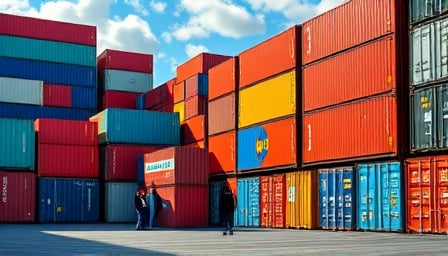Corporate Analysis: Kuehne + Nagel International AG Amidst Market‑Wide Pressures
Kuehne + Nagel International AG (K+N), the Swiss‑based freight‑transportation specialist, has endured a sustained downturn in share value over the past twelve months. A retrospective assessment shows that an investor who committed capital to the company a year ago would have incurred an approximate 33 % loss. The decline is symptomatic of both sector‑specific headwinds and broader macro‑economic pressures that are reverberating across the Swiss equity market.
Sector Dynamics and Key Drivers
The freight and logistics industry has been navigating a confluence of challenges:
Weak Sea‑Freight Outlook: Global shipping volumes have contracted, and freight rates have been depressed by excess supply and lower commodity demand. K+N’s heavy reliance on ocean freight exposes it to the cyclical nature of marine logistics, resulting in earnings volatility.
Evolving Trade Policies: Tariff uncertainties and shifting supply‑chain strategies have altered freight patterns, reducing demand for certain routes where K+N has significant market share.
Digital Disruption: Competitors are accelerating digitalization and platform‑based logistics solutions. While K+N has launched initiatives such as the “K+N 360” digital platform, the pace of adoption across its global network remains uneven.
Capital Expenditure Constraints: Rising fuel costs and regulatory compliance requirements have increased operating expenses, squeezing margins in an environment where freight rates are under pressure.
Market Sentiment and Analyst Perspectives
The Swiss market’s performance is mirrored in the SMI, the country’s principal equity index. Over the last trading week, the SMI has slipped approximately 2 %, reflecting a broader decline in investor sentiment and a muted Swiss economy. This macro backdrop has amplified the downward pressure on K+N shares.
JPMorgan’s Negative Watch: The bank’s recent “Negative Watch” signals concern over the sustained weakness in sea‑freight demand and its implications for K+N’s revenue stream.
Bernstein’s Market‑Perform Rating: Despite the negative outlook, Bernstein maintains a neutral “Market Perform” recommendation. This stance suggests that, while the company faces headwinds, it remains positioned within the mid‑tier of the logistics sector with potential for recovery should freight demand rebound.
Competitive Positioning and Strategic Responses
K+N’s competitive standing hinges on its extensive global network and diversified service portfolio. However, the company must navigate:
Peer Pressure: Major competitors such as DB Schenker, DHL Supply Chain, and Maersk continue to innovate in e‑commerce logistics and sustainable freight solutions, potentially eroding K+N’s market share.
Cost Discipline: Strengthening cost controls and streamlining operations will be essential. This includes optimizing fleet utilization, renegotiating carrier contracts, and leveraging automation in warehouse operations.
Sustainability Initiatives: Aligning with the EU’s Green Deal and Swiss sustainability mandates will be critical. Investment in low‑emission vessels and renewable energy usage can reduce regulatory risks and appeal to ESG‑conscious investors.
Cross‑Sector Implications
The freight sector’s performance has direct spill‑over effects on other industries:
Manufacturing: Lower freight rates may reduce the cost of raw materials, benefiting Swiss manufacturers but also indicating weaker demand for industrial goods.
Retail and E‑Commerce: As logistics costs fluctuate, retail pricing strategies and supply‑chain resilience become increasingly pivotal, especially in the face of shifting consumer expectations.
Energy: Shipping fuel consumption remains a significant component of the sector’s carbon footprint, tying the freight industry’s trajectory to global energy transition policies.
Outlook
While K+N’s share price has declined sharply, the company’s foundational assets—its global footprint, integrated logistics services, and brand recognition—offer resilience. The key determinants for a potential turnaround include:
Resurgence of Sea‑Freight Demand: A recovery in global trade volumes would lift freight rates and lift earnings.
Strategic Investment in Digitalization: Accelerating the rollout of digital platforms could improve operational efficiency and customer engagement.
Cost Management and ESG Compliance: Sustained cost discipline coupled with proactive environmental stewardship will enhance long‑term profitability and investor confidence.
In conclusion, Kuehne + Nagel International AG is currently confronting significant challenges that are both industry‑specific and reflective of broader market conditions. Its ability to adapt to evolving logistics dynamics, manage operational costs, and differentiate itself in a competitive landscape will be decisive in shaping its future performance.
